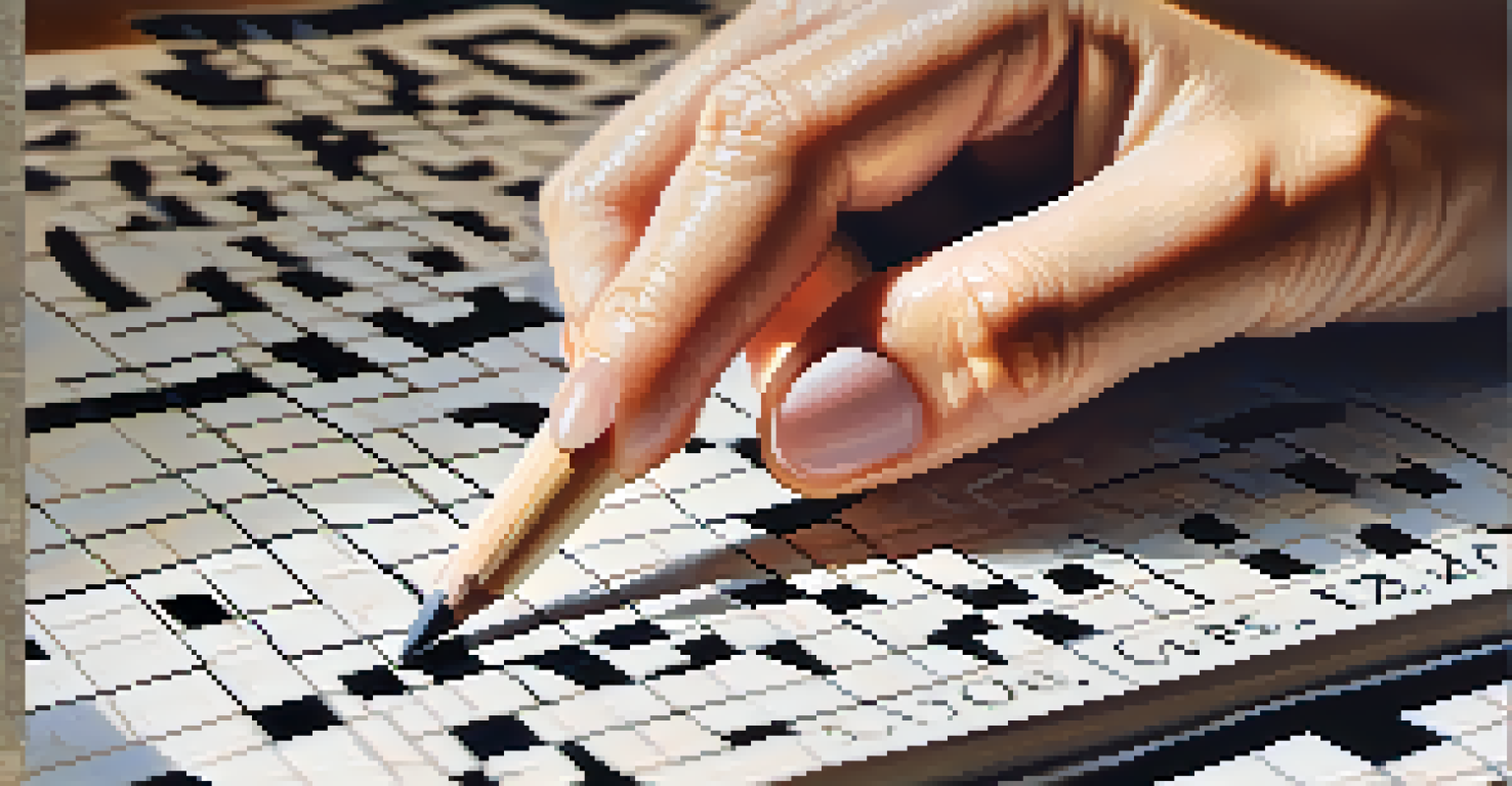How to Solve Cryptic Crosswords: A Beginner's Guide

Understanding the Basics of Cryptic Crosswords
Cryptic crosswords may seem daunting at first, but they're just puzzles in disguise! Each clue is crafted to play on words, using various techniques like anagrams, homophones, and double meanings. To start, familiarize yourself with the format: clues typically consist of a definition and a wordplay component that leads to the answer.
Life is a puzzle. You just have to understand how to piece it together.
For example, a clue like 'Baked goods (7)' could lead you to the answer 'pastries.' Here, the word 'baked goods' serves as the definition while the number indicates the letter count. As you delve deeper, you'll notice that some clues can be quite clever, employing puns and misdirection that keep you on your toes.
The key takeaway? Don't be intimidated! With practice, you'll start to see patterns in clues, making it easier to decode them and enjoy the challenge of solving.
Common Clue Types and Techniques
Getting to know common clue types is essential for cracking cryptic crosswords. For instance, anagrams are a popular technique where letters of a word are rearranged to form a new word. A clue like 'Rearranged art (3)' would lead you to 'tar.'

Homophones are another fun clue type, where words sound alike but have different meanings. If you come across a clue like 'Sounds like a cat (3),' the answer might be 'kit,' as in 'kitten.' The more you practice, the more you'll encounter these clever tricks that will enhance your solving skills.
Mastering Cryptic Crossword Basics
Understanding the structure of clues and common wordplay techniques is essential for tackling cryptic crosswords.
Understanding these techniques not only makes solving easier but also adds an element of enjoyment. Think of it like a game where you're piecing together clues, much like deciphering a secret code!
Building Your Vocabulary for Cryptic Crosswords
A rich vocabulary will serve you well when tackling cryptic crosswords. While you don't need to be a walking dictionary, knowing synonyms and alternative meanings for common words can significantly boost your solving skills. For instance, the word 'big' might also appear as 'large,' 'huge,' or 'vast' in clues.
The joy of solving a puzzle is not in reaching the conclusion, but in the journey of discovery.
Reading widely can help expand your vocabulary. Consider delving into literature, newspapers, and even specialized subjects that pique your interest. You'll not only pick up new words but also familiarize yourself with the varied contexts in which they can be used.
Over time, as you enhance your vocabulary, you'll find yourself recognizing words and phrases that pop up frequently in crosswords. This familiarity can turn a challenging puzzle into a more manageable and enjoyable experience.
Developing a Strategy for Solving
Having a strategy can make all the difference when solving cryptic crosswords. Start by scanning the entire puzzle for clues that stand out to you or look more straightforward. Often, these easier clues can provide letters for tougher ones, creating a domino effect of answers.
Another effective strategy is to work in pencil (or digitally, if that's your preference). This allows you to make changes easily as you uncover more letters or realize a clue isn't fitting. Remember, it's perfectly okay to make mistakes; that's part of the learning process!
Build Your Vocabulary
Expanding your vocabulary through reading and practice will enhance your ability to solve crossword clues.
Lastly, don't hesitate to take breaks if you're feeling stuck. Sometimes, stepping away for a moment can give your brain the reset it needs to return with fresh eyes and new ideas.
Using Online Resources and Tools
The digital age has made it easier than ever to enhance your crossword-solving skills. Numerous websites and apps offer helpful resources like clue solvers, forums, and tips for beginners. These tools can be particularly useful when you're just starting out and need a little extra guidance.
For example, if you come across a tricky clue, a quick search can reveal potential answers, helping you understand the clue's structure and expand your knowledge. Just remember, while it's great to seek help, try to solve independently as much as possible to hone your skills.
Additionally, online communities can be a treasure trove of advice and shared experiences. Engaging with fellow crossword enthusiasts can provide encouragement and insights that make your journey even more enjoyable.
Practicing with Simple Crosswords
Before diving headfirst into tougher cryptic crosswords, start with simpler ones to build your confidence. Many newspapers and magazines offer beginner-friendly puzzles that gradually introduce the concepts of wordplay and clue structure. These simpler variations can help you get accustomed to the format without feeling overwhelmed.
As you practice, pay attention to the clues you find easier and those that stump you. This awareness can guide your focus on specific techniques or vocabulary you need to improve. Remember, even seasoned solvers were once beginners!
Develop Effective Solving Strategies
Having a strategy, such as starting with easier clues and taking breaks, can significantly improve your crossword-solving experience.
Before you know it, you'll find yourself progressing to more challenging puzzles, armed with a solid foundation and a growing sense of accomplishment.
Celebrating Your Progress and Enjoying the Journey
Every crossword you solve is a step forward in your puzzle-solving journey, so take the time to celebrate your progress! Whether you complete a particularly challenging puzzle or simply grasp a new clue type, acknowledging these achievements can boost your confidence and motivation.
Consider keeping a journal of your crossword experiences, noting down difficult clues, new vocabulary, and strategies that worked for you. This not only reinforces your learning but also creates a record of your growth over time.

Most importantly, remember that solving cryptic crosswords is meant to be fun! Embrace the challenges, enjoy the clever wordplay, and relish the satisfaction that comes with unlocking each puzzle. The more you engage with crosswords, the more you'll find yourself drawn into this delightful world of words.